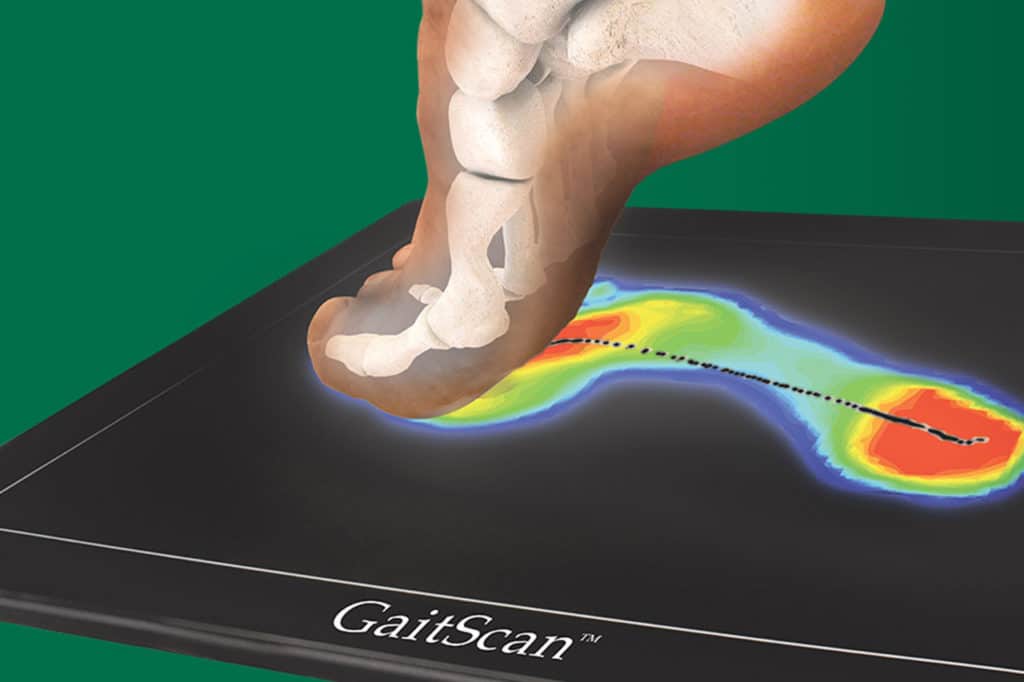A biomechanical assessment is a specialised evaluation of a person’s movement patterns, joint mobility, and muscle strength to identify any potential issues or imbalances in their body. It is often used by healthcare professionals such as physical therapists, athletic trainers, orthopaedic specialists, and biomechanical podiatrists. A biomechanical podiatrist conducts assessments to identify abnormalities and compensations causing pain or discomfort in the lower limbs, providing insights for the best course of treatment.
At Waverley Clinic, we offer comprehensive biomechanical assessments that involve a series of tests and measurements to gather information about an individual’s posture, flexibility, balance, and muscle function. This data is then analysed to identify any areas of concern, such as foot pain, and develop a personalised treatment plan.
In this article, we will discuss the benefits of a biomechanical assessment and how it can help you in your daily life.
What is a biomechanical assessment?
A biomechanics assessment typically involves a thorough examination of an individual’s body mechanics and movement patterns. It focuses on the musculoskeletal system, which includes bones, muscles, tendons, ligaments, and joints. By evaluating how these components work together and how external forces impact them, a healthcare professional can identify any potential problems or imbalances that may be causing pain or limiting performance.
What happens during a biomechanical assessment and gait analysis?
During a biomechanics assessment, the healthcare professional will first gather information about the individual’s medical history and any previous injuries. A biomechanical assessment involves a series of physical tests and measurements to assess their posture, joint mobility, muscle strength, and balance.
A biomechanical assessment involves some common tests such as gait analysis, range of motion assessments, muscle strength testing, and balance assessments. Gait analysis involves observing a person’s walking or running pattern to identify any foot pain, abnormalities, or asymmetries. It also includes examining the foot posture to understand the position of bones and joints in the feet and identify pressure points contributing to chronic pain. Range of motion assessments measure the flexibility and mobility of joints, while muscle strength testing evaluates the strength of specific muscles in different positions. Balance assessments involve standing on one leg or performing other tasks to assess an individual’s stability and coordination.
Based on the results of these tests, the healthcare professional can identify any areas of concern and develop a treatment plan tailored to the individual’s needs.
What are the benefits of a biomechanical assessment?
A biomechanical assessment can provide numerous benefits for individuals of all ages and activity levels. Some potential benefits include:
- Injury prevention / Core strength / Falls prevention: by identifying any imbalances or weaknesses in the body, a biomechanical assessment can help prevent injuries from occurring.
- Improved performance: through targeted exercises and interventions, a biomechanical assessment can help individuals improve their movement patterns and optimise their performance in sports or daily activities.
- Pain relief: if an individual is experiencing pain or discomfort, a biomechanical assessment can identify the underlying cause, including pressure points that may be the source of chronic pain, and provide targeted treatments to alleviate it.
- Personalised treatment plan: a biomechanical assessment takes into account the individual’s unique body mechanics and movement patterns, allowing for a personalised treatment plan that addresses their specific needs. This can lead to more effective and efficient outcomes.
- Long-term benefits: by addressing any issues early on, a biomechanical assessment can have long-term benefits for an individual’s overall health and well-being.
A biomechanical assessment is a comprehensive evaluation of an individual’s body mechanics, movement patterns, and muscle function. It can provide numerous benefits, including injury prevention, improved performance, and personalised treatment plans.
What podiatry-related conditions, including foot pain, can a biomechanical assessment help with?
A biomechanical assessment is particularly useful for individuals who are experiencing foot, ankle, or lower limb pain or discomfort. Some common podiatry-related conditions that can be identified and addressed through a biomechanical assessment include:
- Plantar fasciitis is a condition that involves inflammation and pain of the tissue on the bottom of the heel and arch and is often caused by abnormal foot mechanics.
- Achilles tendonitis: overuse of the Achilles tendon can lead to inflammation and pain, which may be related to underlying biomechanical issues.
- Bunions: a biomechanical assessment can help identify why they have developed and ways to resolve pain.
- Ankle sprains: recurring ankle sprains may be related to underlying biomechanical issues, and a biomechanical assessment can help identify and address these issues.
- Shin splints: pain in the shins may be caused by overpronation or other biomechanical imbalances that can be identified through a biomechanical assessment.
- Knee pain: a biomechanical assessment can help identify and address knee pain by evaluating and correcting any biomechanical issues that may contribute to knee injuries and discomfort.
By addressing any underlying biomechanical issues, individuals with these conditions can often experience relief from foot pain and discomfort and prevent future injuries.
Biomechanical assessments at Waverley Clinic
At Waverley Clinic, our podiatrist, Jonathan Kirk, is trained in performing thorough biomechanics assessments. We use state-of-the-art equipment and techniques to gather data and analyse the results to develop a personalised treatment plan for foot related pain.
Our biomechanical assessment begins with a comprehensive consultation, featuring a digital gait and physical gait analysis using GaitScan technology. This advanced scan evaluates your foot’s function from heel strike to push-off, pinpointing areas of high pressure and discomfort with precise 3D foot shape imaging.
Based on the scan results, we develop a tailored treatment plan for the lower limbs that may include prescription orthotic insoles, stretching exercises, and long-term foot health advice. The Digital Gait Scan ensures an accurate diagnosis and provides exceptionally comfortable orthotic insoles. These insoles are custom-fitted to the unique shape of your foot, offering a snug and flexible fit as you walk and run.
Our aim is to help individuals experiencing pain improve their overall movement patterns and prevent injuries by addressing any underlying biomechanical issues. Our treatments may include exercises to address any imbalances or weaknesses identified during the assessment.
If you are experiencing foot, ankle, or lower limb pain, or if you are looking to improve your athletic performance, consider booking a biomechanical assessment at Waverley Clinic by calling 01252 716611. Our experienced team can help you take the first step towards better foot health and overall well-being.
Why do I need an assessment?
You may be wondering why you need a biomechanical assessment if you are not currently experiencing any pain or discomfort. The truth is that many people have underlying biomechanical issues that can lead to future problems if left unaddressed.
By having a thorough assessment, you can identify and address any imbalances or weaknesses before they cause pain or limit your performance. It is especially important for athletes and active individuals to have regular assessments to prevent injuries and improve their athletic performance.
Overall, investing in a biomechanical assessment can lead to long-term benefits for your overall health and well-being.
How much does a biomechanical assessment cost?
The cost of a biomechanical assessment can vary depending on the clinic and the specific services included. At Waverley Clinic, our biomechanical assessments include a comprehensive consultation, digital gait analysis, and a personalised treatment plan. Interested in finding out more? Do not hesitate to get in touch today. Please call Waverley Clinic at 01252 716611 to book an appointment.
Physical stresses
We all experience physical stresses in our daily lives, whether it is from standing for long periods, walking, or exercising. These stresses can impact the human body, particularly our feet and lower limbs, causing pain and discomfort. By addressing any underlying biomechanical issues through a biomechanical assessment, we can help alleviate these stresses and prevent them from leading to more serious conditions. Additionally, addressing these issues can also improve our overall movement patterns and make everyday activities more comfortable.
Ligaments and connective tissue
Another important aspect of a biomechanical assessment is evaluating the condition of ligaments and connective tissue in the foot and lower limbs, including their blood flow. These tissues play a crucial role in providing stability and support to our bones and joints. By identifying any weaknesses or imbalances in these tissues, we can develop treatment plans to strengthen them and prevent future injuries.
Biomechanical risk factors measured in the workplace
Biomechanical assessments can also be beneficial in the workplace, where individuals may be exposed to repetitive or physically demanding tasks. These activities can put a significant strain on the feet and lower limbs, leading to injuries and discomfort. By conducting regular biomechanical assessments, employers can identify any risk factors for their employees and take preventive measures to ensure their well-being and productivity.
Final thoughts: book a biomechanical assessment at Waverley Clinic today!
Whether you are an athlete looking to improve your performance, experiencing foot pain or discomfort, or simply want to ensure your overall foot health, a biomechanical assessment at Waverley Clinic is the first step towards achieving these goals.
Our experienced team and advanced technology can provide a thorough analysis of your feet and lower limbs, leading to tailored treatment plans that address any underlying issues and improve your overall movement patterns.
So don’t hesitate, book an appointment today by calling 01252 716611. Your feet will thank you!

